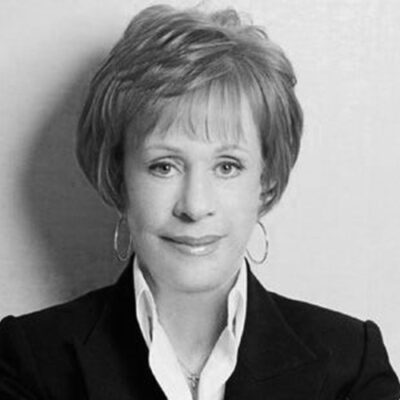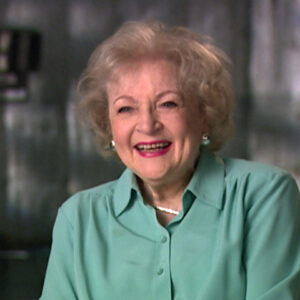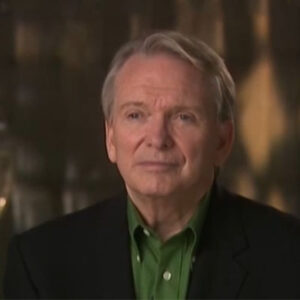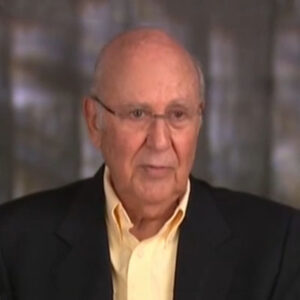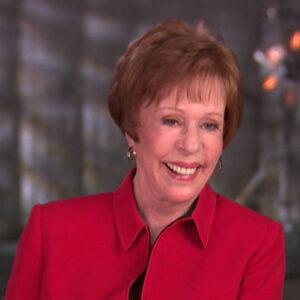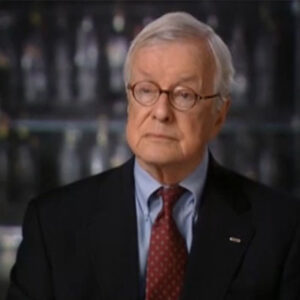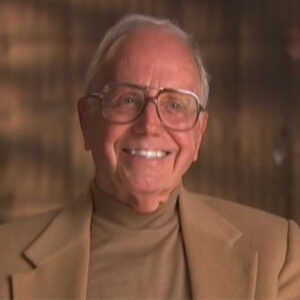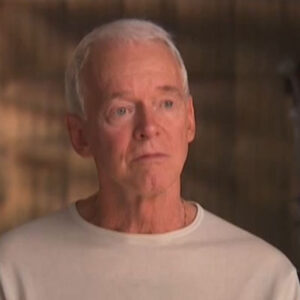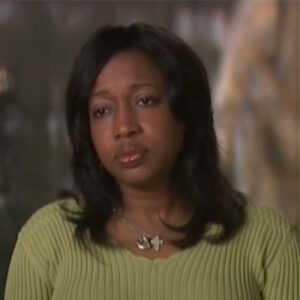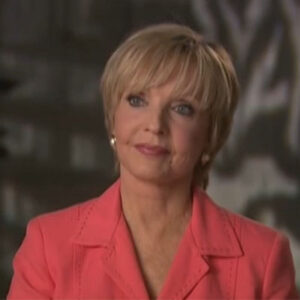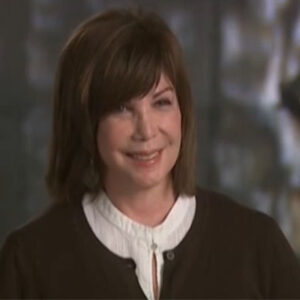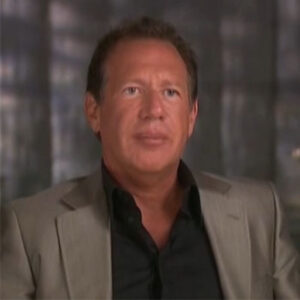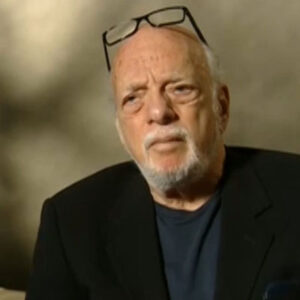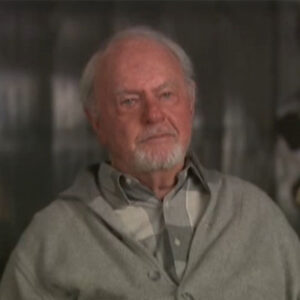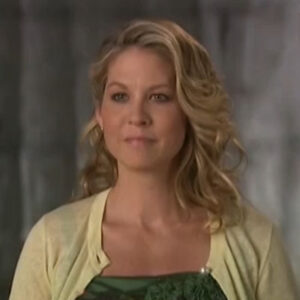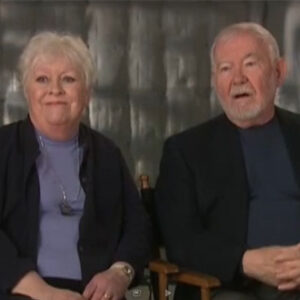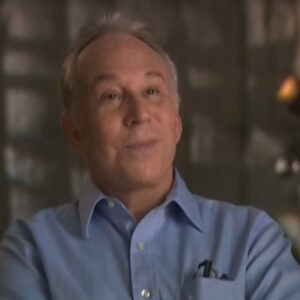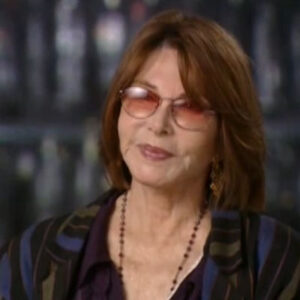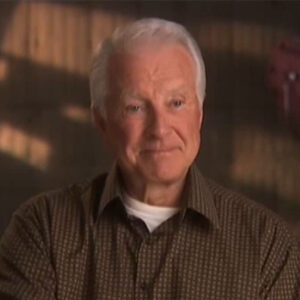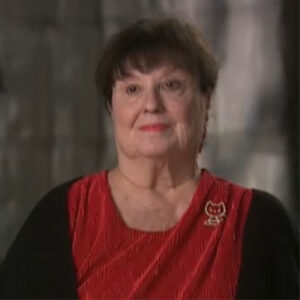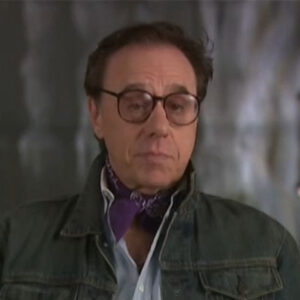Kathleen Turner: Well, growing up, of course, Saturday nights, we all sat around and watched The Carol Burnett Show and we look forward to it every week. And I really think that I learned my whole sense of comedy comes from what I learned watching Carol on her show. All those wonderful sort of parodies and satires. I mean, I saw her, Norma Desmond, before I saw Gloria Swanson’s, Norma Desmond. I saw her Scarlett O’Hara before I ever saw the movie Gone With the Wind. So my sense of all those old movies is really filtered through her. And plus, of course, they did all these huge musical production numbers. They did this many movie musicals. And again, it was I saw her Mickey and Judy movie before I ever saw a real Mickey and Judy movie. So that sense of parody and satire, but it done in a sort of loving way was really incredible.
Interviewer: What was unique about her as a performer?
Kathleen Turner: I think Carol’s this remarkable combination of being an incredible actress, an incredible physical comedian, and also a great musical theater performer. I mean, that voice, that incredible voice, that huge belt voice. And she can also melt your heart singing a ballad. And I don’t know of any other comedian who has that range of talent.
Interviewer: Was she inspirational as a woman in comedy? You remember being aware of that?
Kathleen Turner: Well, I think that, you know, growing up, when you see a woman who’s the center of her own show and it’s called The Carol Burnett Show, and you see how generous she is to other performers, also bringing in new talent, bringing in revered special guests. And to be at the center of her own show like that was really something very powerful, very inspiring.
Interviewer: Can you talk a little more specifically about your favorite sketches or characters? Just remembering moments.
Kathleen Turner: You know, as somebody who was just starting to become a dancer and starting to take dance lessons to watch and see those big production numbers, they would do with, you know, with any flat dancers. And. And she’d be in the center doing these tap numbers and these, you know, huge production numbers. And that was great because, you know, that variety show having all of those the comedy and the sketches and the musical numbers and the choreography was just like having a lesson in musical comedy every week.
Interviewer: She said herself that she was not usually comfortable singing a straight song, but she was she was doing it in character and she never thought of herself as a great dancer. So I just want to talk about seeing her. She was often comedic when they were still working on a Broadway stage.
Kathleen Turner: Oh, yeah. I mean, I can’t believe it. You know, every week they produce these huge, huge numbers. And she was always, you know, whether she was the amazing thing is even if she was parodying somebody like Judy Garland or somebody like that. But she was doing it for real at the same time. I mean, you have to have an incredible talent to sort of become Scarlett O’Hara or become Judy Garland or become Norma Desmond. And the way that her comedy is very sort of full and very and and just sort of large scale. But at the same time, very real, which I think is amazing that she feels it all with reality so that even when she’s being brought, even when she’s falling downstairs or or breaking through a wall or doing some other sort of physical comedy, but it’s filled with such humanity and such reality, I think of her sort of her little old lady with the stringy hair and they go Hasse’s. And you were at the same time that you were laughing at her. You were also fell for her at the same time, her Charr woman, all of those characters. Mrs. Wiggins. I mean, we sort of we love we have to love those characters before we can laugh at them.
Interviewer: It’s interesting. Where do you think that comes from? What are you sensing?
Kathleen Turner: I think that she I think that the characters that Carol creates, she really loves them. It seems to me that she really loves them and she respects them. And even though she puts them into these sort of outrageous situations, she still has such love for those characters. And I think that comes across.
Interviewer: Do you think that’s what sort of differentiate her from sort of the Imogene Coca and Martha Ray? I wonder if you could talk about that. Is that it was this broad slapstick.
Kathleen Turner: Right. Right. I think that really what really makes Carell unique in so many ways is that her characters have this humanity. So even though there’s sort of broad slapstick and broad physical comedy, it’s it’s not just about the beard. It’s about the story. And it’s about the character. And I think she infuses all of her all of her characters with with a reality.
Interviewer: Do you mind? Oh, yeah. I like sort of said, yeah. Some of the other women right at the time, but.
Kathleen Turner: I mean, I think, you know, you have wonderful sort of sketch artists like Imogene Coco and wonderful sort of stand up comics like like Phyllis Diller. But I think what Carol does have combines everything. She’s hilarious, but she’s also doing character based comedy, which I don’t know if I think that was very new for especially for a woman.
Interviewer: Are there any specific numbers that you just remember sort of severe because of the dance numbers?
Kathleen Turner: I remember she always had wonderful guest stars. You know, she’d have people from Broadway like Bernadette Peters and then movie stars like Rock Hudson or great comedians like Nancy Walker. And they would do these great sort of parodies of musicals. And I also loved that they would do these sort of mini musicals using one composer’s work. I remember doing a Gershwin one and Cole Porter one and I think Irving Berlin and they would do these great mini musicals. And of course, I always love when she played sort of a glamorous figure as well, when she and Harvey Korman would play their sort of, you know, Nick and Nora-esque, elegant couple. But you always knew that there was some sort of disaster lying ahead for them. But they all did it all. They did it all with such sort of dignity that it was just hilarious.
Interviewer: That’s one of the things I’m looking at in the documentary, is just the idea that she also it seems at that time, women in comedies sort of cater for women performers, funny or glamorous, right. To never really write together. But she was able to do that. Do you agree?
Kathleen Turner: Yeah, I think the fact that the Carol’s warmth comes across so much and I think that in an era where it was thought that the funny women were sort of brittle and hard in a way. And I think here is this warm, wonderful, open person who can make you laugh, can make you cry. And that’s a unique talent. And I think that she really was sort of the first in that way. And I think that certainly now everybody, every woman who is on TV or Saturday Night Live, Catherine O’Hara, Andrea Martin, Gilda Radner, Molly Shannon, Cheri Oteri, I think they’re all direct descendants of Carol Burnett.
Interviewer: What about the Q and As, can talk about what what they did or what they showed about.
Kathleen Turner: When Carol come out at the beginning of her show and let’s bring up the houselights and she’d answer questions from the audience. I think that was such a brilliant thing because it made her such a real person for all of us. And it made her so warm, so open. And I think it’s one of the one of the reasons that she’s so beloved, as is she opened up herself to us. She wasn’t always sort of hiding behind these characters. And we saw how warm, how quick, how funny. I mean, she would come up with those sort of amazing comebacks and. And it was sort of sort of self-deprecating humor, but at the same time, very, very open and very honest. And I think that’s why fans just love her so much. And you know what, Carol walks down the street. People just have to stop her. They just have to stop her and tell her how much they love her. And they just want to touch her and say thank you. Thank you for all the wonderful years of great television and great comedy and great music.
Interviewer: Do you think she’s different than a lot of stars and stars in that way, that audiences do feel that she’s someone that they know?
Kathleen Turner: I think I think she has this sort of accessibility which people really sort of relate to. And, you know, she’s so distinctive and, you know, in her red hair and to swatch her sort of, you know, walk down the street or or walk through a restaurant and the wave of recognition that follows her and not just recognition, but just delight. She’s really just like sunshine and. And when she walks into a room, the whole room brightens up and and people just want to be near her. They just gravitate towards her.
Interviewer: There are times that particular times that you saw that?
Kathleen Turner: Yeah, you know, we when we were filming Once upon a Mattress in Vancouver, we sometimes as a whole group would kind of go out to dinner or something on a Saturday night after filming. And always, always people would come over to her at the table or the chef would want to come over and say thank you for coming to my restaurant. And she’s incredibly gracious. I mean, that must happen to her every day of her life. And she’s incredibly gracious and always warm and welcoming to her fans.
Interviewer: Tell me how that came about.
Kathleen Turner: Well, I was lucky enough that when when ABC decided to make a new version of Once Upon a Mattress that they asked me to come and meet with Carol, which, of course, was just to meet her, was a dream come true. Excuse me. So I would take a little. I know. And after meeting here, I was lucky enough to be offered the job to direct and choreograph this new version of Once upon a Mattress. Well, I’d grown up with this show. We had the cast album at home. I mean, I danced around the living room trying to belt out shy, just like her. And and I’d seen the young television production she’d done in 1972 playing Princess Winifred. And again, it’s part of Carol’s sort of generosity that she wanted to bring. Once upon a mattress to a new generation and now to play the queen and to have Tracey Ullman play Winifred. And you think that might be a little odd for her? This is the part she originated on Broadway. It’s the part that made her a star. She’d already done this in two different television productions herself and then just so generously kind of pass the baton to Tracey Ullman and and sort of help her and encourage her, but also allow Tracey to kind of just make it her own and do their own thing. It’s really remarkable.
Interviewer: I want to talk about working with her first. You mentioned her, Herbers. Yes. Can you talk a little more about that? Why was that role so perfectly suited for her?
Kathleen Turner: Why was Princess Winifred is the perfect role for Carole? Because it just allows you to do everything she does well, which is to sort of belt her heart out, to do all this wonderful physical comedy. I mean, the whole you know, in Broadway, we have what this called the eleven o’clock number, which is usually sort of the big, you know, penultimate event before the show wraps up. And usually it’s a big musical event. Well, and once upon a mattress, the 11 o’clock number is Winifred trying to fall asleep on these top of these 20 mattresses. And it’s basically physical comedy. It’s like a sort of five minute physical comedy routine. And I think I don’t know of any other sort of comedian, actress who can do that range, who can sort of play this sort of warm, wonderful, unexpected princess sing like that. Seeing that score, which is not an easy score to sing and then turn around and do this incredible. This basically comedic ballet on top of these mattresses.
Interviewer: Can you describe that scene a little more? That’s what she was doing?
Kathleen Turner: Well, you know, the whole thing is she’s trying to fall asleep and there’s, you know, 20 mattresses in the pea underneath. And just just the sort of it’s, you know, sort of starts small and just how she kind of is feeling it and irritated by it and then tries to sort of pound it into the mattress. And I mean, it’s sort of very dangerous. She’s on top of these 20 mattresses. And this sort of fearlessness of of doing this and rolling around on these mattresses. And and just again, is the truthfulness of the comedy comes out because this is a this is a character who desperately, desperately wants to sleep and can’t sleep. And she’s. And something is irritating her. And the fact that it’s this incredible physical comedy. But at the same time, it’s based in complete truth and reality.
Interviewer: Can you just explain briefly what this is about?
Kathleen Turner: What’s what a mattress is sort of a fractured fairy tale version of the Princess and the Pea. And Princess Winifred shows up because she hears that there’s an opening for a princess and the queen, who is very protective of her son, Prince Dauntless. Doesn’t think any princess is good enough for her son. A little Princess Winifred, who’s who’s rather unconventional, devises a test that she knows the princess can’t past, which is a test of sensitivity. She’ll put a pea under under 20 mattresses. But to to everybody’s shock and delight, Winifred does feel the Pea and does get the prince. And I think what it is, is it’s basically the heart of the story is that somebody who might not on the on the outside have the appearance and the manner of a princess. She is a princess because she has the heart and soul of a princess. And I think that describes Carol, because that’s her. She is sort of you know, she is our first lady of American comedy in that way. And and you might not expect it from her. And yet. And yet she is.
Interviewer: That’s true. She might not be the typical glamorous right person and yet she was and is one of the biggest stars.
Kathleen Turner: Yeah. Yeah. Yeah. She’s you know, she’s for somebody who’s sort of with her her her family background and her her upbringing and her education. How she became this first lady of American television is kind of a remarkable story. And it’s through her her own dedication and hard work and also just just generosity.
Interviewer: You were telling me on the phone about a couple stories that she told you about when you were working on a mattress, when she was doing the original.
Kathleen Turner: Yes, she told a great story when we were filming Once upon a Mattress. The new version that when she was doing the original production on Broadway, I think she was performing on Broadway, but also doing the Jack Paar Show. I believe it was at the same time. Always Garry Moore. Sorry. And Carol was performing on Broadway and doing The Garry Moore Show at the same time. And so she has the scene on top of the 20 mattresses when she can’t fall asleep.And apparently she climbed up there and she did Fosse and she hears the stage manager from the wings up, Carol. It’s like does you know, she falls asleep, show over. But but, you know, she’s such a hard worker. And and she just she also tells a great story about when she first moved to New York. She was living in kind of a women’s residence hotel and with several roommates. And they all pitched in to buy one dress. They all sort of pitched in, I think, five dollars to buy a 20 dollar dress. And this became their audition dress. And whoever had the big audition that day would get to wear the dress to go to their audition. And I think that the thing is that Carol’s you know, she’s with all of her sort of fame and success and everything else. She she sort of never forgets what it was like to sort of start off and be an actress. And I think the sense of of privilege that she sort of has every time she sort of walks onto a movie set or a stage or a TV set. And I think she brings with her this this wonderful joy, the fact that she gets to do what she loves. And and she I think that radiates from her and it and really it just affects every set she’s working on because everybody in the cast and everybody in the crew is sort of uplifted by this this kind of effervescence that she has just the original production and why that was. The original director of the Broadway production of Once upon a Mattress was George Abbott, who, of course, is, you know, the godfather of Broadway and had was already a legendary director and producer. And so the fact that he cast this unknown and put her as the lead to Star in his new Broadway show was an incredible, incredible vote of confidence.
Interviewer: When you were working with her. You also choreographed?
Kathleen Turner: Yes.
Interviewer: Can you talk about choreographing Carol? She doesn’t consider herself a dancer but she’s so physical.
Kathleen Turner: I you know, I don’t know why Carol doesn’t consider herself dancer, because she moves amazingly. And, you know, she’s just. Well, that that body, she’s just you know, she’s she’s got those long, long legs and. And she just moves so great. And we were creating this new song that was written for her for our production called That Baby of Mine. And it’s sort of a comic Vampi. No. And I as I was sort of creating it with her, I just had this moment where I had to stop. And I thought I said to Carol I said, you know, here I am, creating a comic vampy number for Carol Burnett. And I said, I only know what a comic vampy number is from watching you. I sort of feel like my whole sense of comedy comes from growing up and watching her television show. I remember seeing her on the Lucy show doing hardhearted Hannah The Vamp from Savannah, G.A., and it was you know, she played this mousy character who all of a sudden breaks out and does this kind of torchy song. It is kind of sexy and vampy. And that’s the thing is that is that Carol can play that range. She can play sort of mousy characters. And she you know, she can play these sort of older characters. She can play glamorous characters. She can play kids. She can play at, you know, any range of characters.
Interviewer: And what was she, she had a role besides acting in Once Upon a Mattress?
Kathleen Turner: In our new version of Once Upon a Mattress, she was also one of our producers. And, you know, she is incredible because she’s so prepared. She’s so diligent. She really is a director’s dream. And that she comes to the set completely prepared, but also completely open and flexible and collaborative. And also just pure fun. We just were so happy every day that she was filming.
Interviewer: What was her role as producers? Hasn’t produced that many things. Later on, she’s starting to produce things. Yeah. Some people we’ve talked to producing it sometimes not for the faint of heart.
Kathleen Turner: Yeah. Yeah, it’s true. No, I think the Carols is we have such respect for Carol and for all of her sort of ideas and opinions. And so as a as a producer, she’s wonderful because she’s very clear and she’s very direct and she’s very sort of no nonsense. But she really cares about what the show is. She cares about the casting. She cares about the production design. She cares about the script. She cares about, you know, the final editing and the music. She really sort of has such passion for all of it. And and she has fantastic taste. So what could be better than having a producer who has sort of talent and taste and it’s sort of clear and direct and what they want?
Interviewer: How? Tell me, when it aired and how it was received.
Kathleen Turner: What was wonderful is that when our once upon a mattress aired, we got sort of nice response. But Carol got the most amazing reviews and the most amazing response. And I think people were just so happy to sort of see her. And, you know, when. It’s just remarkable because she can just with just a sort of roll of her eyes or a sort of little scowl or a little left of the corner from Mals, she can say so much. I mean, the sort of the power that she has with just to do say so much with so little is kind of remarkable.
Interviewer: What did you see her sort of bring any scene that wasn’t on the page?
Kathleen Turner: Well, you know, she’s what’s wonderful is in playing queen aggravation is that the queen is very sort of obviously irritated at a lot of things, but also trying to sort of cover it up. And what’s so great is that, Carol, consider to be saying one thing, but meaning something else. Just through the tone of her voice, we’re just a little flick of her eye or sort of a sideways glance. She just can she just can say so much and and give you just that nice little sort of spin with her face as expressive. Oh, yeah. I think that, you know, she really has this malleable face that can kind of just in a second give you any sort of emotion.
Interviewer: What did she tell Tracey all about, was there any sort of passing the baton of that role?
Kathleen Turner: Carol was an incredibly gracious to Tracey Ullman and kind of just answering any questions she had. But also kind of letting stepping back and letting you sort of, Tracey, make it her own. And, you know, we would always sort of ask Tracey and I would ask her more questions and she would always answer them. But she would kind of she wouldn’t. She didn’t want to interfere either. She sort of wanted Tracey to make it her own, which I think is so generous. And I think it’s also great that that Carol, always, always has been connected with every production of Once upon a Mattress from the original Broadway production to now all three television productions. And I think it really is. She has such love for the show and she wants to sort of see it done well.
Interviewer: In fact, I think when she left the original production. It was recast and didn’t do as well. Oh, yes. What’s the role perfect for her? It perfect for a production? Yeah, I think yeah.
Kathleen Turner: With with Carol and Princess Winifred, it was this kind of, you know, just perfect convergence of a performer and a role. And, you know, that happens not very often in Broadway history. Those sort of legendary performances, whether it’s, you know, Ethel Merman or her, Mary Martin or Ray Boulger or, you know, to see Carol Burnett, the original Once Upon a Mattress was once upon a lifetime experience, I think.
Interviewer: What do you think? Just sort of looking back. What do you think her biggest gift to us?
Kathleen Turner: I think Carol’s biggest gift to us has just been her spirit. Her her the way that she looks at the world, which is sort of in a in a warm and loving, but also offbeat and quirky way. So the fact that all these whether it’s parody and characters from movies or characters that she creates on her own, she sort of infuses them with such humanity that we laugh. But at the same time, it also gives us a really wonderful perspective.
Interviewer: Great. Thank you so much. So if you could talk about she’s gone from stage to TV to movies. If you can just talk about why TV in particular seems to work so well for her stage, like what is a person on television versus stage versus film. Right.
Kathleen Turner: I think for somebody like Carol who’s worked in every medium there is from stage to television to film. I think there’s something about the immediacy of stage, the energy that she that she puts out and the sort of synergy that she creates with her audience, that it’s really remarkable. And I also think that that’s somehow coming into our homes every week, every Saturday night, and especially starting with those those. Q and A’s just made her our friend. I think we all sort of feel like like she’s our, you know, our neighbor, our ont our cousin or our sister. I think everybody sort of feels a connection to her because she was there. She was taught. I felt like she was talking to us every week.
Interviewer: Do you think her show, because it was done in front of a live audience, still had that?
Speaker Yeah, so absolutely. I think the fact that her TV show was filmed in front of a live audience and the sort of excitement and and danger of that came across every every week. I mean, we waited for them to sort of for something to go wrong or for them to crack each other up or for a prop not to work. And, of course, the the cast thrived on that. And I think that that wonderful ensemble of actors with with Carell and Harvey Korman and Tim Conway and Vicki Lawrence and Lyle Wagner, what they created was this incredible energy. It really was like a sort of modern day comic troupe. And and and the fact that they had this kind of live performance, I mean, you know, how many TV variety shows do you have, live music and life singing these days? Not very many. And that’s really a sort of that’s a that is a dangerous tightrope walk to take every week to sing and dance and do physical comedy in front of a live television audience. And and she was amazing.
Interviewer: Do you think it was a different process for her other things when you saw your audience? Right. Do you ever talk about that? There’s nobody laughing.
Kathleen Turner: Yeah, well, you know, the great thing was that when we did Once Upon a Mattress, we rehearsed it like a Broadway show. We actually rehearsed for a month before we started filming. And so because we had to learn the choreography and the music and were worked out all the sort of physical comedy and which was great and it was actually very hard sometimes when you’re filming not to laugh. Carol Burnett, we had to sort of, you know, warn everybody no matter what she does. Don’t laugh because, you know, you sort of it’s a very different medium. And I think that you’re right for for for comedy and for music, you need that kind of give and take with the audience. You need their participation through their laughter and applause, which is probably also why Carol is really shines in front of a live audience.
Interviewer: Thank you so much.

